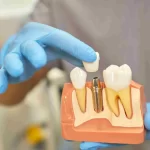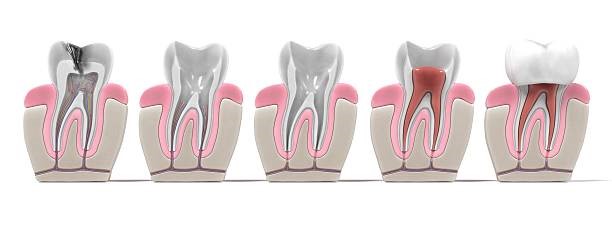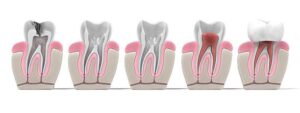The American Association of Endodontists states that a root canal treatment is the most common dental chair procedure. Over 15 million root canal treatments are done in a year in the United States. Post- treatment root canal infections are fairly uncommon after an RCT, but possible. What are the signs you’re supposed to look out for that indicate re-infection? Find them listed below, along with more information on a root canal treatment.
When Is A Root Canal Treatment Recommended?
If you’re showing any of the following signs, your dentist will recommend an RCT –
- Pain or discomfort that is associated with a tooth, which is unbearable and worsens on applying pressure.
- Tenderness in a tooth – hurts on chewing food, or by simply touching.
- Pain that is worse at night.
- Tender gums that are red and swollen.
- Colorless, yellow, or green discharge from the gums.
- Bad breath or a bad taste that persists despite proper brushing and flossing.
- Tooth sensitivity to hot or cold beverages and/or foods.
- Tooth discoloration.
- A tooth that is cracked or chipped.
- A tooth that might be feeling loose.
Your dentist will always perform a thorough examination coupled with X-rays before deciding to proceed with a root canal treatment. The procedure is painless due to the use of local anesthesia. Patients might experience some soreness afterward, which can be taken care of by using over-the-counter painkillers.
How Do Root Canal Infections Occur?
Teeth are made of two parts –
- The crown: Made up of hard enamel, and is visible in the oral cavity. Present over the gum line.
- The root: Not visible in the oral cavity, except in cases of gum disease. Present below the gum line.
Moreover, teeth are formed in multiple layers – they aren’t one solid structure. As mentioned previously, the crown is made of enamel, which is cushioned by a layer of soft and spongy dentin underneath. The pulp or pulp cavity is located in the center and consists of blood vessels and nerves that maintain the tooth’s vitality. Odontoblasts, which are dentin-forming cells, are also present in the pulp cavity.
If there is a long-standing cavity in a tooth or worsening gum disease, the infection can reach up to the root and pulp cavity. Once this occurs, a patient will feel intense pain and discomfort. If timely intervention isn’t done, it can lead to abscesses and eventually, pulp death. A root canal treatment entails the removal of the pulp cavity contents and replacing it with a rubber compound.
Teeth that have undergone a root canal treatment might not get infected again. But there’s a very small chance they might.
Root Canal Treatment Infections – What to Look Out For
Aside from the normal soreness that one might feel after treatment, anything else indicates re-infection. Post-procedure pain is common only up to a week. If your pain persists beyond this timeline, you will have to visit your dentist. Certain delayed infections can also cause issues months or years after a root canal treatment.
Be on the lookout for of any of the following signs –
- Pain and discomfort, particularly on applying pressure.
- Sensitivity to different temperatures.
- Inflammation, tenderness, and redness of the gums.
- Any facial swelling.
- Any occurring discharges.
- Persisting bad breath or bad taste.
Remember that any infection that is left untreated for a while will spread to surrounding areas – this includes gums, other teeth, spaces in the face and neck, and ultimately, the bloodstream. This can get life-threatening. The spread can be minimized if help is sought at the first sign of an infection.
Why Do Re-Infections Occur?
Although pretty uncommon, teeth that have undergone root canal treatments can get re-infected. The causes can be any of the following listed –
- The root canals might have a complicated shape. This can cause some infected areas undetected during the treatment. These areas can fester and cause re-infection.
- Improper cleaning and disinfection due to narrow or curved canals.
- Extra canals which are untouched and harboring bacteria.
- Delay or failure of the application of permanent restoration like dental crowns.
- Trauma to the tooth, causing a chip or crack. This can get infected.
- Poor oral hygiene and habits can also lead to re-infection of the treated tooth.
Treatment of Infected Root Canals
A repeat root canal treatment is usually advised in cases of re infections. Your dentist at Minneapolis Dental will perform another RCT to give your tooth a second chance. Similar to the original therapy, a thorough examination is done, and X-rays are taken to assess the condition of the affected tooth. The procedure is carried out under local anesthesia to keep the patient calm and free of any discomfort.
Rubber dams help isolate the tooth that is to be treated and prevents contamination with saliva. The material that was previously inserted is removed with the help of a dental drill. The area is cleaned and disinfected after the removal of infected tissue, filler material, and medication if any. The pulp space is dried and new filler material is introduced and sealed with an amalgam or composite resin. A dental crown is advised to prevent any future infections.
Prevention of Root Canal Infections
Re-infections can be avoided by taking proper care of the tooth and the surrounding areas.
- Following proper habits, including brushing and flossing twice daily. Additional use of an anti-bacterial mouthwash prevents infections.
- Over-the-counter medication to help soreness after treatment.
- Being diligent about getting a permanent restoration. Revisit your dentist at the earliest to fit yourself for a crown – this is key to preventing future infections.
- Getting cleanings done by your dentist at least twice a year. This removes any buildup of plaque and calculus, warding off gum disease.
- Avoiding habits like smoking go a long way in the health of your oral cavity.
- And perhaps the most important thing – if you notice any sign of infection, rush to your dentist ASAP.
If you feel like you could have an infected root canal, don’t delay help any further. Call us at 612-332-1255 to schedule an appointment at Minneapolis Dental today. Help us help you!



















